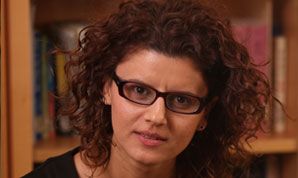The Road to Hi-Tech Runs through Taibeh
The integration of talented Arab employees into Israel’s hi-tech sector could relieve the human-resources shortage for employers. Encouraging Arabs to enter the hi-tech industry could improve their economic situation significantly, which would reduce inequality and contribute to a reduction of social tensions in the Arab community. Encouraging high-quality employment for Israeli citizens would boost tax revenues and improve the general economic situation over the long term. Finally, and equally as important, studies show that joint workspaces contribute to better understanding of the "other" and reduce social tensions.

Last month, it was reported that Prime Minister Benjamin Netanyahu, in his capacity as Minister of the Economy, is looking into the possibility of bringing engineers from India to relieve the human-resources shortage in Israeli hi-tech companies.
The hi-tech sector is an incredible source of pride, and everything possible should be done to nurture and develop it. The prime minister’s proposal, however, is the wrong way to go about achieving his goals. As it happens, in my research I found there are thousands of Arab engineers with engineering degrees from the Technion or from other Israeli universities who are waiting to put their hard-earned skills to work. However, in the absence of concrete job opportunities, they must either find jobs in different fields, such as teaching, or sit at home, unemployed.
OECD reports have cited the social disparities in the Arab sector as a problem that must be addressed. Arab women have the lowest participation rate in the Israeli job market, and 40 percent of the men are employed in jobs that require physical labor, forcing them to retire at a young age. At the same time, according to statistics provided by Tsofen, an Arab-Jewish non-profit organization that works for the integration of Israel’s Arab citizens into the startup nation, approximately 1,600 Arab students are studying at academic institutions for degrees in fields that are relevant to the hi-tech industry. These students must deal with several built-in obstacles: They live far away from tech hubs; they lack professional networks in the industry; and they face prejudice when attempting to enter the workplace. The government should mobilize its resources to solve these problems by providing incentives, job-search assistance at employment centers and encouragement to employers to diversify their pool of employees.
This would achieve four major goals:
First, the integration of talented Arab employees into Israel’s hi-tech sector could relieve the human-resources shortage for employers. Second, encouraging Arabs to enter the hi-tech industry could improve their economic situation significantly, which would reduce inequality and contribute to a reduction of social tensions in the Arab community. Third, encouraging high-quality employment for Israeli citizens — as opposed to foreign workers from India or anywhere else — would boost tax revenues and improve the general economic situation over the long term. Finally, and equally as important, studies show that joint workspaces contribute to better understanding of the "other" and reduce social tensions.
Before we bring in engineers from the Far East, let's take a look at the Triangle, which produces skilled engineers, and if possible head north toward the Galilee, where many Arabs are earning degrees at top-notch institutions such as the Technion. Let's also look ahead and build a holistic plan to direct Arabs toward hi-tech via special science tracks in schools. We must do more to create industrial and employment zones near the Arab communities.
The prime minister’s proposal to strengthen the tech industry with qualified engineers is welcome. Let's look for these talented men and women within our own borders. We should all work to make Arabs full participants in the startup nation. Israel will be the first to benefit from it. Mr. Prime Minister, the road to Israel’s economic development runs through Taibe, Sakhnin and Nazareth.
Nasreen Hadad Haj-Yahya is the co-director of the Arab-Jewish Relations Program at the Israel Democracy Institute.
